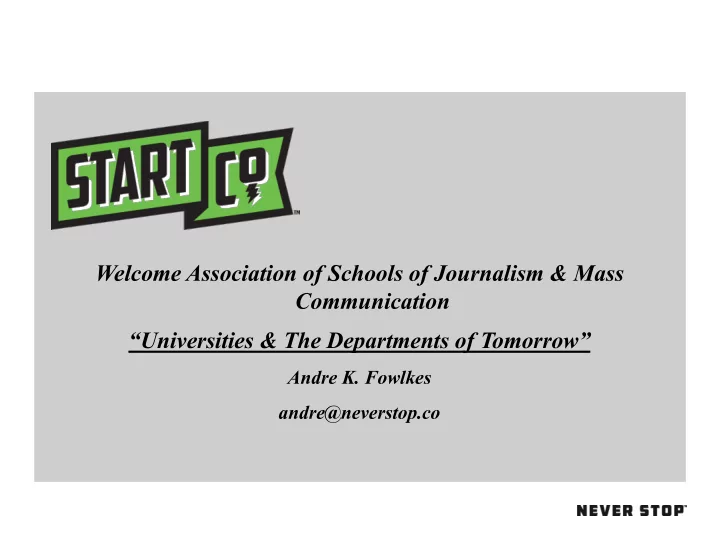

Welcome Association of Schools of Journalism & Mass Communication “Universities & The Departments of Tomorrow” Andre K. Fowlkes andre@neverstop.co
University of Memphis Entrepreneurial Journalism Graduate Certificate: 12 hours Required Courses: Total of 6 credit hours • JOUR 7100 Entrepreneurial Media (3) • JOUR 7300 Social Media Theory and Practice (3) Electives: 6 credit hours chosen from the following: • UNIV 7110 Launch Memphis 48 Hour Launch (2) • UNIV 7110 LaunchMemphis BarCamp, SocialCamp,MobileCamp (2) • UNIV 7110 Business Plan Boot Camp (1) • UNIV 7110 Launch Memphis ad hoc mentoring (3) • JOUR 7650 Startup Journalism Practicum (3) • MGMT 7270 Venture/Bldg/Sustaining a Successful Enterp (3) • FIR 7648 - Evaluating/Finance New Projects (3) • ACCT 7412 - Legal/Accounting Aspects of Entrepreneurship (3)
Relentlessly Building Founders and Companies Build Quality Startup Companies Through to Market Entry Bolstered with Global Accelerator Network Entrepreneurship for Everyone Create a Cultural Shift & Growing and Investing Lending Best Practices National Reputation Resources and Support Locally
WHY STARTUPS?
In the past 30 years, all net new job growth stemmed from high-growth entrepreneurial companies.
0.05 0.15 0.25 0.35 0.45 0.1 0.2 0.3 0.4 Our Economy is Changing 0 1940 1942 Manufacturing's share of total employment 1945 1947 1950 1952 1955 1957 1960 1962 1965 1967 1970 1972 1975 1977 1980 1982 1985 1987 1990 1992 1995 1997 2000 2002 2005 2007 2010
Rise of Technology & A New Way of Building
Existing firms are the source of most job creation and job destruction but… 20 18 18.2 16 16.7 16.2 15.8 14 14.9 14.8 12 1980-89 10 1990-99 8 2000-09 6 4 3.5 2 3 2.6 2 1.9 0.9 0 Gross Job Gross Job Net Job Growth Job Creation Creation Destruction Start-Ups Source: Haltiwanger, Jarmin and Miranda (2011)
Lean à Iterative à Action = Opportunity for Success Mentorship Founder’s Toolkit Resources
Looking at Your Department as a Startup
The Three D’s Discovery Delivery Dollars
Discovery Customer Discovery • Problem Hypothesis • Solution Hypothesis • Price Hypothesis • Go To Market Hypothesis
Delivery- Can you actually build it? Prototyping Iterative Approaches Testing & Learning Experiments with Real Customers
Dollars- Can you build a case for investment & support? Traction Revenue Access
Methods Open Source Tools Business Model Generation The Lean Startup Accelerators Ad-hoc
City University New York
The Power of Social Innovation
Discovery Personal Discovery Civic Discovery System Discovery Predictive Discovery
Innovating is Hard Entrenched Thinking Prescriptive Funding Curse of Professionalism Aversion to Risk & New Ideas
Crafting Your Intervention • Technological Glue • Civic Realignment • Filling the Management Gap • New Volunteer & Donor Goodwill Pipelines
Creating Entrepreneurial Universities: Burton R. Clark Organizational Pathways of Transformation
The Strengthened Steering Core “Unambitious universities tend to drift with the tides” • Their complexities have increased • Pace of change has accelerated • Depend on reputation Refashion programmatic capabilities Comprehensive Flexible Faster Drive the action
The Expanded Developmental Periphery Knowledge transfer Industrial contact Intellectual property development Continuing education Fundraising Alumni affairs
Dr. Gary Michelson
The Diversified Funding Base Discretionary Funds Philanthropic Foundations Earned Income
The Stimulated Academic Heartland “Traditional academic values are firmly rooted at the department level” • Infusion of innovation • Become an entrepreneurial unit • New programs, partners, & income • Participate in central steering groups
Integrated Entrepreneurial Culture Enterprising Universities Are we embracing change? Are we opening space for new ideas? Are we problem solvers? Are these common fabrics that unite us?
The Innovation Driven Economic Development: A Practical Guide for the Regional Innovation Broker
Innovation is About Ideas & Recipes Expertise Interaction Diversity Innovation Application
From: To: Closed Innovation Logic Open Innovation Logic 1. Not all the smart people in 1. The smart people in the the world work for us and world work for us our customers have ideas to 2. In order to bring new products & services to the 2. External ideas when integrated into your market we must discover architecture, can be as and develop them ourselves valuable as internal ideas 3. If we discover it ourselves 3. We don’t have to originate (& own) the research in we will get it to the market order to profit from it ourselves
From: To: Closed Innovation Logic Open Innovation Logic 1. If you create the most, 1. If you make the best use best ideas in the industry of internal and external you will win ideas you will win 2. We should sell our IP to 2. We should control our those that can make intellectual property so good use of it, and we that our competitors should buy IP whenever don’t profit from our it fits our own business ideas model
Who Are Your Innovation Brokers? Conceive Modify Plan Talent Technology Capital Act Learn Measure
Regional Innovation Movement: Universities Are Major Players Innovative Economy Livable Inclusive Regional Community Society Innovation Collaborative Governance
Elevator Pitching • Brief description • Customer you serve and the problem you solve for them • Example • The Ask
Thank-You Andre K. Fowlkes andre@neverstop.co
Recommend
More recommend